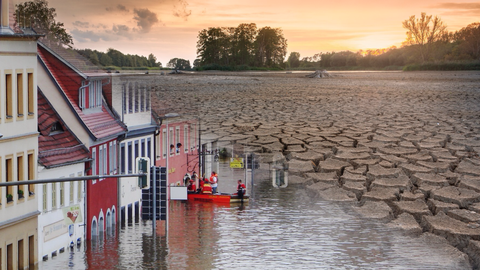Dec 16, 2023
Drought and flooding: Water, the elixir of life, in the climate crisis
Water – sparkling, medium or still? Or as a storm surge, flood or not at all? The first is a decision we can make in a restaurant, the second is a decision that is taken out of our hands. Water is the basis of everything. But if it is too much, it cannot be stopped. If it is too little, it cannot be replaced. In times of climate change, this can become life-threatening. Floods like those in the Ahr valley could become the norm even in Germany, as could spells of droughts during summers that last for weeks.
Such developments challenge us humans to generate ideas on how to deal with the changing environment. TU Dresden has made water a prime focus of its research. With its Institute of Hydraulic Engineering and Technical Hydromechanics, one of the focuses is on flood management. With the Global Water and Climate Adaptation Centre (ABCD Centre), TUD contributes to the global goal of a sustainable availability of water and sanitation. The Center for Advanced Water Research (CAWR) strives to take a holistic view on water and its correlations within the complex environmental system. That this topic is so essential was also evident at this year's UN Day in Dresden. On November 9, TU Dresden, UNU-FLORES, the City of Dresden and the Local Agenda Dresden, as well as many other stakeholders, invited people to the event at the Dresden City Hall to discuss water as the basis of life, in research, and in times of climate change.
Prof. Jürgen Stamm, Chair of Hydraulic Engineering at TUD, discussed current research priorities in the field of water with Dresden's Mayor for the Environment Eva Jähnigen, water and climate expert Dr. Valentin Aich and the Director of UNU-FLORES Prof. Edeltraud Günther. All of the experts agreed that urgent action is needed both globally and locally. Local decisions can also have an impact on the South that is heavily affected, so we need to think in multiple dimensions. The experts also focused on flood and drought management, which is often underestimated in Germany and needs to get more attention. Not enough consequences are derived from disasters until the very next one is overwhelming again. At the same time, there are already promising visions and projects for adapting to climate change. Some of these projects were honored with the 27th Local Agenda Prize that evening. These included the BUND's “Biodiverse Sponge City” project, which has the potential to contribute to urban unsealing. These and other projects generated from initiatives and research will be needed to cope with climate change - because water is life!
Author: Hedda Wern

